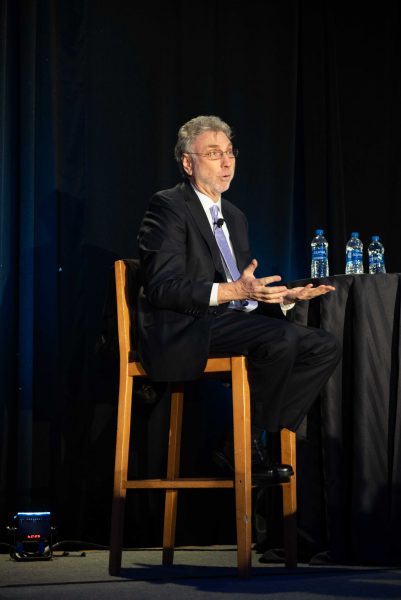
Martin Baron, executive editor of the Washington Post, was a main speaker at this year’s Associated Collegiate Press/College Media Association conference. Lily Merritt | Washtenaw Voice
Journalism doesn’t matter now more than ever—it’s always been essential, according to Tracy Grant, managing editor for standards and ethics of the Washington Post.
At this year’s Associated Collegiate Press/College Media Association conference, held in Washington, Grant led a discussion about journalism in the age of advocacy. Her take? The only thing a journalist should be an advocate for is the truth.
By advocating for truth, a journalist may spark change, but it’s not their job to set out to “save the world,” Grant said.
Instead, it is a journalist’s job to be a “watchdog” in society and hold public officials accountable; it is the job of the journalist to inform the public of the truth and make sure citizens know what their government and major institutions are doing.
This idea of watchdog journalism is also outlined in the Society of Professional Journalists’ code of ethics. The Society has represented journalists in the United States since 1909 to “ensure that the concept of self-government outlined by the U.S. Constitution remains a reality into future centuries,” according to its website.
“Whether that truth is acted on is not the domain of the journalist… it’s the domain of the citizens,” Grant said.
Journalism has always been vital to society—as Grant pointed out, it’s the only profession that the founding fathers chose to protect in the constitution. However, in the age of Instagram, Twitter and instant-sharing, any and everyone can publish information, making ethical, responsible and accurate journalism uniquely important, and often difficult to distinguish.
Today, it seems like everyone is advocating for something. Ethical journalism will only prevail if journalists remain committed to the truth.
Marty Baron, executive editor of the Washington Post, also addressed students at the conference. If Baron’s name sounds familiar, you may know it from the movie “Spotlight,” which depicts Baron’s experience helping to expose a sexual abuse cover-up in the Roman Catholic Church while working at the Boston Globe.
Baron emphasized the importance of professional journalism in a functioning democracy. He said reporting truth is not a matter of power or popularity, but a first principle; it’s the central role of the press to tell people what’s going on in government.
Although in recent years public opinion polling has shown declining public trust in news reporting, it’s important to not be distracted by attacks on the press, said Baron. He added diversity in newsrooms help protect against becoming an out-of-touch echo chamber.
“We need to be writing about everybody in the country,” said Baron.
“We need to make sure our work is done vigorously so it is validated over time,” he added.

